I am sure that you realize that the Scriptures make it very clear that the Flood covered the whole earth.
God said that the entire earth was going to be destroyed by the Flood.
“And God said unto Noah, The end of all flesh is come before me; for the earth is filled with violence through them; and, behold, I will destroy them with the earth” (Gen. 6:13).
Genesis 7:11-24 KJV
[11] In the six hundredth year of Noah’s life, in the second month, the seventeenth day of the month, the same day were all the fountains of the great deep broken up, and the windows of heaven were opened.
[12] And the rain was upon the earth forty days and forty nights.
[13] In the selfsame day entered Noah, and Shem, and Ham, and Japheth, the sons of Noah, and Noah’s wife, and the three wives of his sons with them, into the ark;
[14] They, and every beast after his kind, and all the cattle after their kind, and every creeping thing that creepeth upon the earth after his kind, and every fowl after his kind, every bird of every sort.
[15] And they went in unto Noah into the ark, two and two of all flesh, wherein is the breath of life.
[16] And they that went in, went in male and female of all flesh, as God had commanded him: and the LORD shut him in.
[17] And the flood was forty days upon the earth; and the waters increased, and bare up the ark, and it was lift up above the earth.
[18] And the waters prevailed, and were increased greatly upon the earth; and the ark went upon the face of the waters.
[19] And the waters prevailed exceedingly upon the earth; and all the high hills, that were under the whole heaven, were covered.
[20] Fifteen cubits upward did the waters prevail; and the mountains were covered.
[21] And all flesh died that moved upon the earth, both of fowl, and of cattle, and of beast, and of every creeping thing that creepeth upon the earth, and every man:
[22] All in whose nostrils was the breath of life, of all that was in the dry land, died.
[23] And every living substance was destroyed which was upon the face of the ground, both man, and cattle, and the creeping things, and the fowl of the heaven; and they were destroyed from the earth: and Noah only remained alive, and they that were with him in the ark.
[24] And the waters prevailed upon the earth an hundred and fifty days.
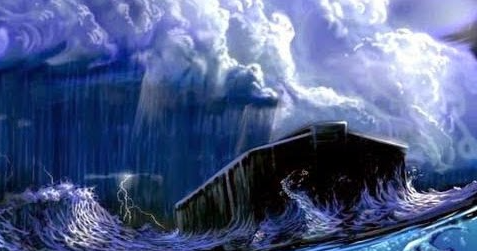
Genesis 7:11
In the six hundredth year of Noah’s life, in the second month, the seventeenth day of the month, the same day were all the fountains of the great deep broken up, and the windows of heaven were opened.
The water came from above and from below. As well, it is believed by some Scientists, and rightly so, that the waters came with such force from the Earth, that it would have taken only a few days to have cut the Grand Canyon and other such similarities.
This verse points to a very specific day in the life of Noah for the beginning of the flood. Scholars have suggested many possible reasons this date might be significant.
The most obvious one may be that including a specific date for the beginning of the flood gives the report authenticity. In short, the flood is not a myth. It began on an actual day in the history of the world.
On that day, the Creator began to destroy much of what He had made and nearly all of the wickedness sinful humanity had made on the earth.
In addition to a specific starting date, chapter 8 will give exact dates for the landing of the ark, for the receding of the waters, for the drying of the earth, and for the exodus from the ark.
Clearly, the text means for us to understand exactly how long each phase of the flood lasted, from beginning to end. This cataclysmic judgment of God was a historical event in the life of the world.
We are told that on that day all the fountains or springs of the great deep burst forth. The picture is of geyser spewing its contents into the sky, implying that a great underground ocean had existed and had been under some amount of pressure since the beginning of creation.
In addition, the “windows of heaven” were opened. Great torrents of rain poured from the sky.
The language is poetic, but it also parallels God’s work on the second day of creation. Genesis 1:7 tells us that God created an “expanse” of atmosphere between the waters below and the waters above.
Some scholars speculate that the waters above created a kind of canopy around the earth. They suggest that in this moment that canopy was broken and the waters above the earth poured down to create the flood. Others dispute this, but either interpretation is compatible with the text.
In any case, the earth was about to revert to its original state of being covered by water.
Genesis 7:12
And the rain was upon the earth forty days and forty nights.
The literal Hebrew translation is, “And there was violent rain…”.
The previous verse describes the two directions the floodwaters came from. On the one hand, water gushed (“burst forth”) from below the surface of the earth. On the other, a torrential rain poured down out of the sky.
Now we’re told for the first time that it rained for 40 days and nights.
The coming chapters will explain that 40 days of that kind of rain, combined with the water uncorked and bursting from below, will be adequate to cover the entire earth.
Once again, the earth will be covered with water as it was before the second day of creation (Genesis 1:9–10). As with prior verses, scholars note that the term ‘erets is used here, translated as “earth,” which is often used in a symbolic or local sense.
The Hebrew term tebel, specifically meaning the entire planet, is not used in the flood accounts. This is part of the debate over whether the flood was planetary, or only in the region occupied by men.
Regardless of that question, there is no question that this torrent of water accomplished its purpose: the elimination of the entire human race, except for Noah and his family.

Genesis 7:13
In the selfsame day entered Noah, and Shem, and Ham, and Japheth, the sons of Noah, and Noah’s wife, and the three wives of his sons with them, into the ark;
On the day the rains began, Noah and his family entered the Ark.
The Bible credits Noah with obedience to God (Genesis 6:22; Genesis 7:5). That obedience is a key part of the story here, as the flood begins. At the very beginning of this chapter, Noah is given the command by God to board the ark.
Common sense says it would take time to finish loading the ark with all the animals and last-minute supplies. According to verse 4, God had given Noah seven days’ notice.
This verse shows how Noah’s obedience was, once again, critical to success. On the very day they finished boarding the ark, the flood waters arrived. Any delay would have been catastrophic.
On the day the flood started, apparently, the small company of humans and huge contingent of animals, birds, and insects entered the ark.
Whether this meant every animal, or, more likely, the last of the animals which had been boarding, the text does not specifically say.
The human men are named here again: Noah and his three sons Shem, Ham, and Japheth. Each man had a wife, who is not named.
Together, these eight people would restart the human race in the new beginning God would establish after the flood.
Genesis 7:14
They, and every beast after his kind, and all the cattle after their kind, and every creeping thing that creepeth upon the earth after his kind, and every fowl after his kind, every bird of every sort.
They, Noah and his family, went into the ark; as did all sorts of beasts and cattle, reckoned one hundred and thirty sorts, by some one hundred and fifty, including serpents.
Supposed to be scarce thirty sorts; not one sort of creature was left out, though ever so small, and despicable. If divided into nine sorts, and reckon them up to be one hundred and ninety five in the whole.
Bird of every wing, let their wings be what they will; some, are winged with feathers, others with skin, as bats.
The previous verse described in more detail the eight human beings who boarded the ark on the day the rains came. This verse gives a bit more detail about the non-human occupants of the boat.
It important to remember that Genesis claims a supernatural work of God in gathering and delivering these animals to the ark.
God wanted to save a representative of every kind of beast, every kind of livestock, every kind of “creeping thing” (which would include insects), every kind of bird, and every kind of winged creature.
As some have noted, such a collection of predators and prey, of large animals and small, could never have occupied such a space together if God had not orchestrated it for the purpose of preserving animal life on the planet.
The repetition of this information is also part of the story. A theme of Genesis is God’s ability to make good on His promises.
Earlier parts of this story describe what God is predicting, later ones describe those events happening exactly as God said they would.
Rather than simply saying, “animals went on the ark,” Scripture emphasizes the details. This highlights the idea that God’s will, and His knowledge, are specific.
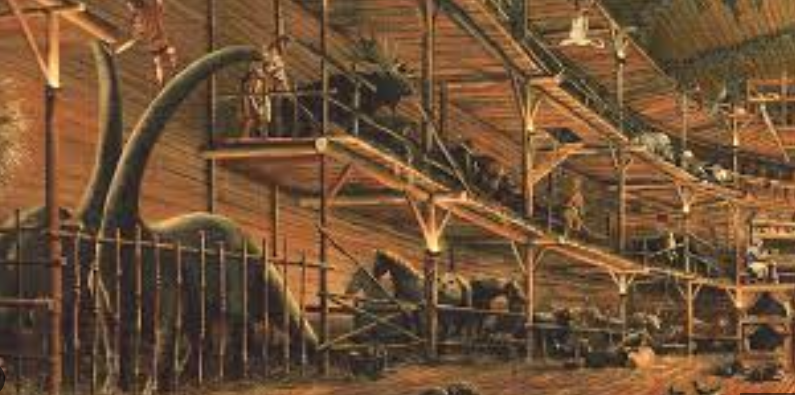
Genesis 7:15
And they went in unto Noah into the ark, two and two of all flesh, wherein is the breath of life.
The Lord gave these animals the instinct to do what they did.
Animals, birds, and creeping things of every kind were saved from the flood by entering into the ark with Noah. They arrived as pairs, male and female, entering the ark together. Noah was not an animal whisperer.
Prior verses indicated that God would send the animals to Noah, rather than Noah being expected to capture them (Genesis 6:20).
This chapter describes nothing less than a supernatural work of God, carefully and powerfully orchestrated, to save every kind of air-breathing life on the planet from the judgment of God’s wrath.
Most of this information is not new, but the Bible often repeats details in order to make a point. God’s will, and His knowledge, are specific. When He says something will occur, it occurs exactly as He predicted.
Here, rather than simply noting that animals went onto the ark, Genesis re-describes the same basic instructions God gave earlier. The purpose is to emphasize God’s omniscience and omnipotence, and the truth of His words.
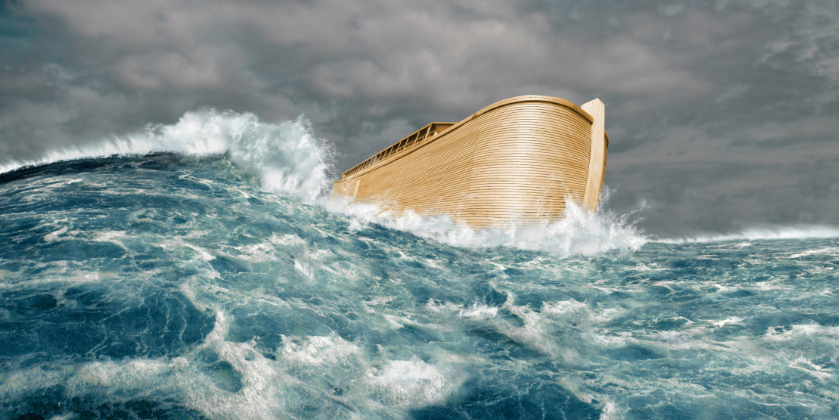
Genesis 7:16
And they that went in, went in male and female of all flesh, as God had commanded him: and the LORD shut him in.
The contrast between the two names of the Deity is most vividly presented here. In this one Verse, both “God” and “LORD” are used. It is “Elohim” Who commands Noah about the beasts, It is “Jehovah,” the Covenant God, Who ensures his safety by closing the Ark behind him.
Nothing can more fully express the Believer’s perfect security in Christ than those words, “the LORD shut him in”.
Under normal circumstances, there is simply no way for a man to capture, alive, representative samples of all animal life. This would have been especially difficult if that same man was also tasked with building an enormous ark to house those animals.
According to the Bible, God never commanded Noah to track down these animals. Instead, God sent them to Noah (Genesis 6:20). This was God’s power executing God’s plan.
Still, Noah is commended for saying “yes” to all God commanded (Genesis 6:22, Genesis 7:5). He did what God said, when God said, and how God said.
God still executes His plans through obedient servants without expecting them to have the power in themselves to do the impossible.
This verse also makes a very specific, very important point about how the ark was sealed in preparation for the flood. The closing of the ark is specifically credited to God Himself.
This symbolism will become crucial in our understanding of God and salvation. This is important for two reasons.
First, this act emphasizes that it is God who is saving life from judgment. And, it serves as a reminder of God’s promise to preserve those He has saved. Both to Noah, and to us, this is a symbol of God’s ability to keep those He has saved.
Second, and of critical importance, is the fact that the door was not shut by Noah. When every life meant to be saved had boarded the ark, God shut Noah and all who were with him inside.
Their security wasn’t earned by something Noah had done. Noah was not the one who decided when the door would be shut, or when the opportunity for salvation would be lost to those outside. All of these are exclusively God’s prerogative.
Genesis 7:17
And the flood was forty days upon the earth; and the waters increased, and bare up the ark, and it was lift up above the earth.
Wherever it was that Noah built the Ark, the flood waters reached it, and it began to float.
What is the scientific, historical evidence for the Flood?
In the previous verse, God shut Noah and his family and the animals into the ark. Then the torrential rains began. Verse 11 described it as the windows of heaven being opened.
Just as God said (Genesis 7:4), that intense downpour lasted for 40 days on the earth. The floodwaters increased, and the huge ark floated, rising high above its initial resting place on the earth.
Noah had followed God’s instructions well; the great craft proved to be seaworthy.
As with other verses in this chapter, Genesis uses the term ‘erets for “earth,” rather than other terms such as tebel. The Hebrew word ‘erets is often used in a regional or symbolic sense, while tebel is a specific reference to the entire planet.
This is part of the ongoing debate over whether or not the flood is a planetary event, or something confined to the regions populated by men. In any case, the waters accomplish their intended task: wiping out sinful mankind, and sparing only Noah and his family.
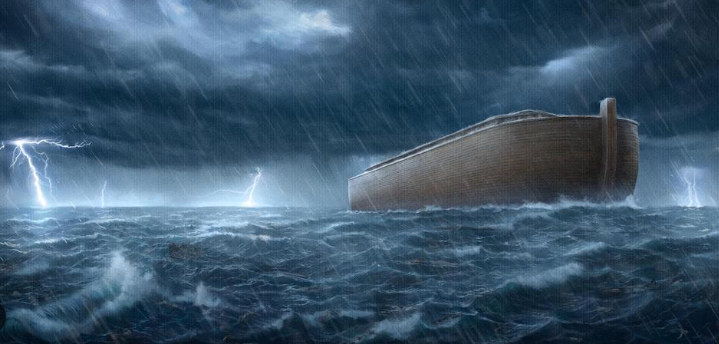
Genesis 7:18
And the waters prevailed, and were increased greatly upon the earth; and the ark went upon the face of the waters.
Probably pertains to the fact that the scoffers flattered themselves that it would abate, and never come to extremity; but still it increased, and prevailed.
We were told in the previous verse that the floodwaters increased or multiplied. Now we’re told that the waters “prevailed.” This is from the Hebrew root word gabar. This is a military term, used for winning victory in battle.
It can also mean “overwhelmed, overtook, or conquered.” Anyone who has seen a flood or tsunami in action knows how much power there is in moving water. Beneath the ark, the flood waters overwhelmed everything on land, while rising higher and higher.
The rise of these waters, in some ways, is a reversal of God’s initial creation. In the beginning, God drew dry land out of the water (Genesis 1:9–10).
Here, in judgment, He is sending that land back under the waters. This is, in literal action, God “resetting” this aspect of His creation.
Although the waters destroy everything on land, they do not prevail, over the ark. We were told in the previous verse that the boat floated high above its original place on the ground. Now we’re told that it floats on the surface of the water.
The ark and its inhabitants were on the move. It’s worth noting that the ark is actually not a “boat.” There are no oars, sails, rudders, or other controls mentioned. It has one purpose: to float above the destruction, and let God take care of the rest.
Genesis 7:19
And the waters prevailed exceedingly upon the earth; and all the high hills, that were under the whole heaven, were covered.
Those who dwelt upon the tops of the loftiest mountains perished equally with those who lived in the deepest valleys. There was no difference.
Many who live upon the mountains of morality think themselves secure from the judgment of fire that is now coming, and pity the certain fate of those who live in the depths of vice.
But without Christ, all will perish.
As in the prior verse, Genesis uses the Hebrew root word gabar, translated as “prevailed or triumphed” to describe the victory of the floodwaters of God’s judgment.
This catastrophic effect is shown in how high the water rises over the surface of the ground. The water is said to cover all of the highest hā’rim. This term, hā’rim is also often translated as “hills,” or even “high hills.”
This is important in the discussion of whether or not this was a planetary flood, or a “local” flood only affecting the regions inhabited by men. The tallest peaks in the Middle East region are not nearly as high as those in other places on earth.
The highest point in the middle east is Mount Damāvand, in Iran, more than 18,000 feet (5,600 m) above sea level. Israel’s highest point is in the Golan Heights, and rises almost 7,300 feet (2,200 m) above sea level.
By comparison, Mount Everest is more than 29,000 feet (8,000 m) high, and some parts of Argentina are more than 22,000 feet (nearly 7,000 m) tall.
In other words, according to proponents of a local flood, the amount of water needed to annihilate the early territory of men would have been far, far less than that needed to cover the peaks of the planet’s highest mountains.
At the same time, others have speculated that the eruption of the waters from the deep, in combination with the enormous forces of the floodwaters on the earth, resulted in the creation of the mountains as we know them today.
That would include these various points already mentioned.
In any case, the Bible is explicitly claiming that the waters from this flood covered every meaningful point of land, leaving no possibility of escape or rescue for those who were not on the ark.
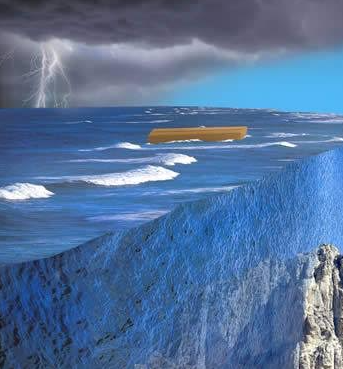
Genesis 7:20
Fifteen cubits upward did the waters prevail; and the mountains were covered.
Above the highest mountains. Many Scholars believe that before the flood the tallest mountain in the world was approximately 10,000 feet or less. “the great deep being broken up” changed much of the topography of the world, making huge canyons and, at the same time, huge mountains.
The previous verse told us that the floodwaters covered all the highest points of the land. In other words, the flood left no bit of dry land anywhere that a person could run to in order to survive the waters.
Proponents of a local flood note that the highest points in the Middle East are significantly shorter than those in other places on earth.
They also point out that the term used for earth here, ‘erets, does not imply the entire globe in the same way as the Hebrew word tebel.
The ability to flood the regions inhabited by men to an extreme depth would not have required the same level of covering in uninhabited places.
This verse also gives more specific details about the depth of the waters. According to Genesis, the closest any peak of land under the flood came to the surface of the water was 15 cubits, which is approximately 22 feet or 7 meters.
This depth may be important for two reasons. For one, such a depth would have given the traveling ark the ability to float without obstruction above every land mass.
Second, such a depth would assure that no human being or animal would have been able to survive the flood, even if they succeeded in climbing to the top of the highest available peak.
God’s judgment on all the land-dwelling, air-breathing life would be absolute. Nothing would be left alive that was not inside the ark. In particular, the entire race of men, other than Noah, was destroyed.
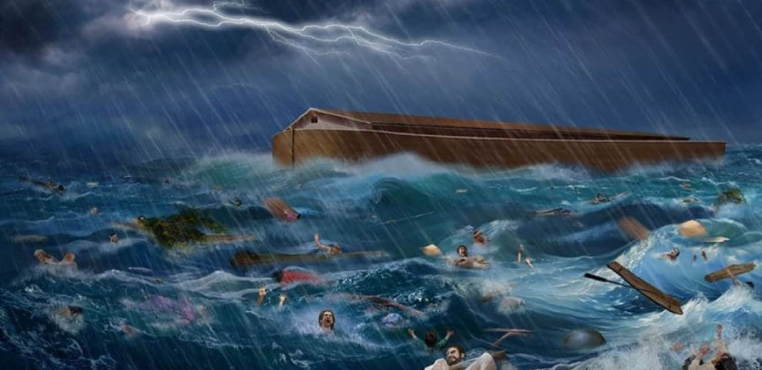
Genesis 7:21
And all flesh died that moved upon the earth, both of fowl, and of cattle, and of beast, and of every creeping thing that creepeth upon the earth, and every man:
The fish were not destroyed, but others that had animal life in them, of which motion was a sign upon the earth were. Excepting those that were in the ark.
This general destruction of the creatures, as it was for the sins of men, whose they were, and by whom they were abused, and is expressive of God’s hatred of sin, and of his holiness and justice in the punishment of it.
So, on the other hand, it is a display both of the wisdom of God, in causing a decrease of the creatures, in proportion to the decrease of men, who now would not need so many.
And of the goodness of God to those that were spared, that so the beasts of the field, especially the wilder sort, might not multiply against them, and prevail over them, see Exodus 23:29. Except those in the ark.
And the number of them is supposed to be as great, if not greater, than of the present inhabitants of the earth, by those who are skillful in the calculation of the increase of men.
It is thought it may be easily allowed, that their number amounted to eleven billion. And some have made their number to be eighty billion. The Apostle Peter calls them, the world of the ungodly, 2 Peter 2:5.
Up to this point in the story of the flood, the focus has stayed with the ark, and with the eventual survivors. Now it moves to clearly indicate what happened to everything left outside of the ark. In short, everything died.
The verse lists some of those groups: birds, livestock, beasts, wild animals, and swarming creatures, along with every single human being.
While some debate whether or not this was a local or global event, this verse makes the outcome of this event explicitly clear: not a single person survived this disaster, other than those aboard the ark.
The experience of those first moments while the waters rose must have been truly terrible. Those aboard the ark were finding out, in the critical moment, whether or not this vessel would support them.
As promised, of course, it did (Genesis 7:17). An additional source of nerves would have been the ark’s lack of control. This structure was not a “ship,” and had no oars, sails, or rudders.
It was simply a waterproof box. But, since it was designed by God (Genesis 6:14–16), and sealed by God (Genesis 7:16), it served its purpose well.
The end result of this deluge was final and absolute. Everything died, except for the remnant on the ark adrift on a single, vast ocean.
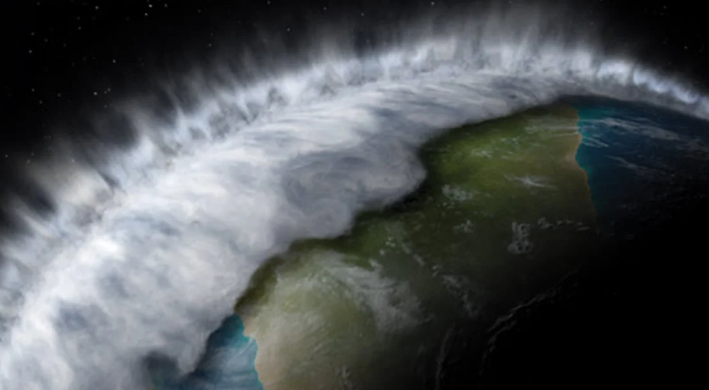
Genesis 7:22
All in whose nostrils was the breath of life, of all that was in the dry land, died.
Not one wave of that judgment reached Noah; he was absolutely safe. Noah could not perish because the Ark could not perish. The Ark could not perish because Jehovah was in the Ark.
In effect, the Ark was Christ.
Therefore, God was in Christ, reconciling man unto Himself.
These last few verses of Genesis 7 seem to repeat the same idea over and over. This is not an accident. Repetition in ancient literature was often used to emphasize the truth or importance of a statement.
In this case, God had promised to “blot out” all mankind, and every land- and air-dwelling creature, as judgment on mankind’s sin (Genesis 6:13).
Some debate whether this judgment by God required a planet-wide event, or a flood confined to the regions inhabited by men. For the purposes of the story, such a question is actually beside the point.
As this verse makes clear, everything not protected from the flood by the ark died. Every land-dwelling, air-breathing thing confronted by the flood was killed, including every single human being other than Noah and his immediate family.
Interestingly, no mention is made of fish or other sea-dwelling creatures, who apparently survived the flood.
Or, who at least were able to survive in sufficient numbers that there was no need for Noah to preserve them on the ark. God’s judgment was limited to the land, as it was a response to humanity’s pervasive evil (Genesis 6:5).
Genesis 7:23
And every living substance was destroyed which was upon the face of the ground, both man, and cattle, and the creeping things, and the fowl of the heaven; and they were destroyed from the earth: and Noah only remained alive, and they that were with him in the ark.
Only those who are “in Christ” are saved. There are no exceptions [Jn. 3:16]. On the other hand, there have recently come from the press several books by men whom I consider to be pseudointellectuals and pseudo theologians.
They take the position that the Flood was local, that is, that it was confined to the Tigris-Euphrates Valley.
In other words, it was sort of a big swimming pool and that is about all. The Genesis Flood absolutely demolishes that thought altogether, and I am sure that you realize that the Scriptures make it very clear that the Flood covered the whole earth.
God said that the entire earth was going to be destroyed by the Flood. “And God said unto Noah, The end of all flesh is come before me; for the earth is filled with violence through them; and, behold, I will destroy them with the earth” (Gen. 6:13).
The human family had already gotten to North America, and the animals were certainly there—nobody would argue that point for a moment.
But if you say that the Flood was not universal, then you have someone besides Noah starting the human family over again—and that is just not the way the Word of God tells it.
You are on the horns of a dilemma, as I see it: you either have to accept the Word of God, or you have to reject what it says.
To my judgment, to attempt to make a case for a local flood is actually, in the long run, to reject the Word of God.
The Bible makes it very clear that it was a universal flood. “And every living substance was destroyed . . . and Noah only remained alive, and they that were with him in the ark.”
These last few verses of chapter 7 seem repetitive, and they are. This is a very deliberate technique, used often in ancient literature. Stating certain facts over and over was a way of emphasizing their truth and importance.
In this case, Genesis is making it clear that no human or animal life survived the flood, other than those aboard the ark.
This verse also uses repetition to remind us that this wasn’t “just” a natural catastrophe. God blotted out (or wiped out) all the human and animal life. He caused the flood. As Creator and Judge and God, He acted out of His authority to execute justice.
In a sense, God is un-making some of what He has made, by taking dry land back beneath the water (Genesis 1:9–10). God would not allow the violence of mankind to go on as it had. He ended it.
From this distance, and from a merely human perspective, this scale of death is inconceivable to most of us. It is uncomfortable. It challenges our very idea of who our God is.
It is essential that we understand both His righteousness and His mercy. God has not changed in His nature. He will not abide sin, and He will in mercy save some from destruction.
The rest of the Bible is the story of how sinful, mortal man could ever possibly be at peace and even loved by such a righteous, powerful, just, and holy God.
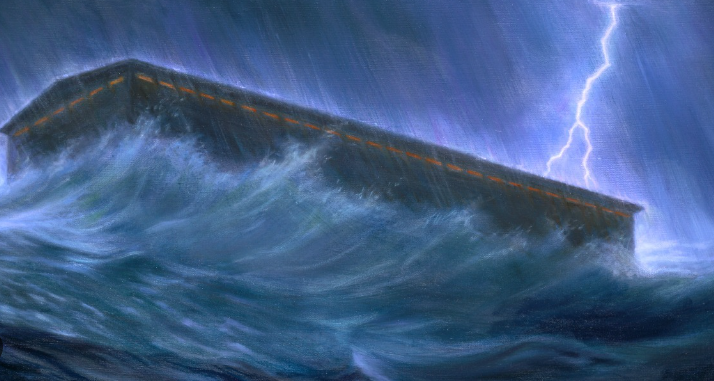
Genesis 7:24
And the waters prevailed upon the earth an hundred and fifty days.
Which is to be reckoned not from the end of the forty days’ rain, but from the beginning of the flood.
For from the seventeenth day of the second month, when the fountains of the deep were broken up, and the windows of heaven were opened, unto the seventeenth day of the seventh month, when the ark rested on the mountains of Ararat, and the waters decreased, were just five months, or one hundred and fifty days.
Until which time the waters increased yet more and more, even after the forty days’ rain. So that it seems there was a continual rain afterwards, or otherwise it is not so easy to account for the increase of the waters.
In other words, for a period of approximately half a year, for five months, the waters prevailed on the earth. The Genesis Flood not only answers the question of its being a universal rather than a local flood, but it also answers this question of uniformitarianism.
There are those who take the position that there was no such thing as a great convulsion or catastrophe like the Flood. Peter makes it very clear that we should expect such scoffers.
“Knowing this first, that there shall come in the last days scoffers, walking after their own lusts, And saying, Where is the promise of his coming? for since the fathers fell asleep, all things continue as they were from the beginning of the creation” (2 Pet. 3:3–4).
The scoffer has always been a uniformitarian, but you could not very well hold that position and accept the integrity of the Word of God at this particular point.
This is very important to see.
This verse brings us back to the Hebrew root word gabar, translated as “prevailed” in the ESV and other versions. It is a word used to refer to a military victory.
The floodwaters “triumphed, overwhelmed, overcame or conquered” the surface of the land for 150 days, remaining victorious over everything beneath.
Those who have witnessed a large river, a broken dam, or a tsunami have seen the immense power of moving water. Water only a few feet deep has the strength to tear down buildings and drown virtually any land animal.
According to the Bible, the flood waters around the ark were never less than 18 cubits (22 feet or 7 meters) above the highest point of land. That’s an invincible quantity of water, and nothing in its path survived (Genesis 7:23).
These 150 days include the first 40 days of torrential rain, followed at some point by the end of water gushing up from below. After this, the waters beginning to recede. But, for another 110 days, the flood waters utterly destroy everything in their path.
As we’ll see in the next chapter, the ark will finally come to rest on solid ground after those 150 days.
I hope that you have really enjoyed this post,
Please Leave All Comments in the Comment Box Below ↓

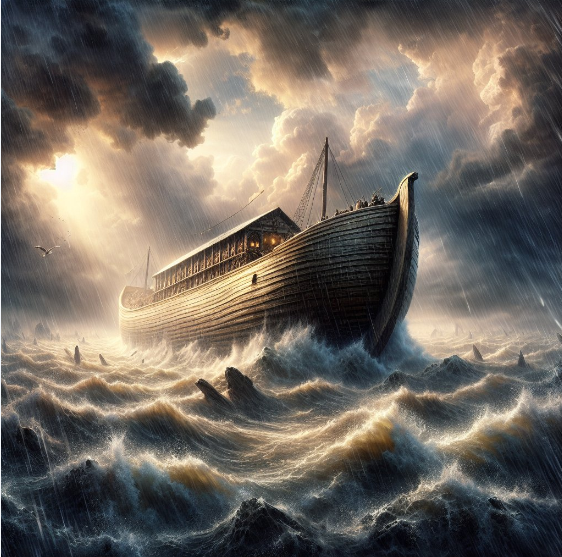











I marvel at His greatness every time I read the account of Noah and the waters.
I love your emphasis on the depth of the waters. Water to a depth of 18 cubits is lots of volumes. It tells me we serve a Great God. If He can bring the world to an end with water, He can do it also with fire.
Jesus is another ark for the salvation of our souls.
Hello Parameter,
Thank you for your continued support, as well as, taking the time to comment on this HBS & DwJ episode.
Your comments are greatly appreciated.
Blessings My Friend!
The author of the article highlights the significance of the specific date mentioned in the verse, suggesting that it lends authenticity to the account and emphasises that the flood was not a mere myth.
Scholars note that the term “earth” used in the passage can be interpreted symbolically or locally, sparking debates about the extent of the flood. However, the primary focus is on the fact that the flood served as a means of divine judgment, wiping out the wickedness of humanity while sparing Noah and his family.
Overall, the article provides a concise summary and analysis of the passage from Genesis, emphasising its historical significance and the devastating nature of the flood.
It raises interesting points regarding the date specificity, the sources of water, and the symbolism in the account.
Hello Demi,
Thank you for using a portion of your time to stop by, read, and for sharing with us your views and explanation of the summary and analysis of this passage.
Your opinion on the topic is very much appreciated.
Blessings My Friend!
Thank you, HBS and DWJ, for your thorough examination of the biblical flood account.
Your in-depth exploration of the text and references to various scholarly interpretations give readers plenty to think about.Your breakdown of the Genesis verses paints a vivid picture of the catastrophic event and its historical significance.
It’s compelling how you bring out the specifics of the timeline, and the suggestion that these add authenticity to the account is fascinating.
I was particularly intrigued by the discussion surrounding Genesis 1:7 and the idea of a “canopy” around the earth, as well as the speculation about the term ‘erets and its implications for the scope of the flood.
The debate over whether the flood was global or regional is an interesting point of contention among scholars, and I appreciate that you included it in your analysis. It invites the reader to delve deeper into the text and its potential interpretations.
Hi Anoth,
Thank you for stopping by, reading, and taking the time to comment on another Holy Bible Study session, turned HBS & DwJ Podcast episode.
During my studies on these scriptures, even though I have studied them before, they seem to offer even more Revelation.
As I have said before, I always enjoy learning more about God’s view of us, His creation because I find it to be particularly interesting, so thank you for seeing He, who is in me.
You are most certainly welcome for mythorough examination of the biblical flood account.
Blessings My Friend!
The article you’ve written about the biblical story of the Flood is quite comprehensive, and it seems you have put a lot of effort into researching and explaining various aspects of the event.
As a beginner in this topic, I find the idea of a global flood and the destruction of all living beings except those inside the Ark to be quite intriguing. My experience with this topic is limited to what I have learned from Sunday school teachings, so I’m eager to learn more.
In your article, you mentioned that some scholars speculate about the scientific and historical evidence for the Flood. As someone new to this, I’m curious to know what kind of evidence exists to support the claim of a global flood.
Are there any geological or archaeological findings that point to a catastrophic flood event that covered the entire Earth, as described in the Bible?
How do scholars reconcile the biblical account with scientific evidence or opposing viewpoints?
Hello skamalka,
Thank you for coming back to read, and comment on the HBS & DwJ website turned Podcast episode platform.
A catastrophe as swift and wide-spreading as a global flood would leave marks on the continents across the globe, even 4,500 years later—and that is exactly what we see today.
Fossils are one of the best evidences of a global flood, especially where many fossils are found. For example, we don’t find marine creatures, such as fish, clams, and corals, buried and fossilized on the sea floor where they once lived.
Instead, we find most of them buried in sedimentary rocks on the continents, even on high mountains. For that to happen, the ocean waters had to totally flood the continents. And that’s exactly what the Holy Bible describes during the global flood.
Fossils aren’t the only present evidence that confirms the Genesis account of the global flood. Covering vast areas on every continent are sedimentary rock layers laid down by the catastrophic flood conditions. Many of these sediment layers can be traced all the way across continents and even between continents.
Continued Thanks for your participation,
Blessings My Friend!
Wow, this is powerful!
When God destroyed all the flesh from the earth during the Flood, it was to purify the earth because of all the sins that were committed. I guess that this will be the case these days because we see all the governments supporting the evil or calling it good.
We are very much in the days of Noah and I thank you for these studies.
Keep it up!
Hello again angelce903,
Thank you for stopping by, continuing to add value to this HBS & DwJ Platform.
Your comments are definitely appreciated, I’d love to hear back from you about other episodes.
Thanks for continuously stopping by,
Blessings My Friend!